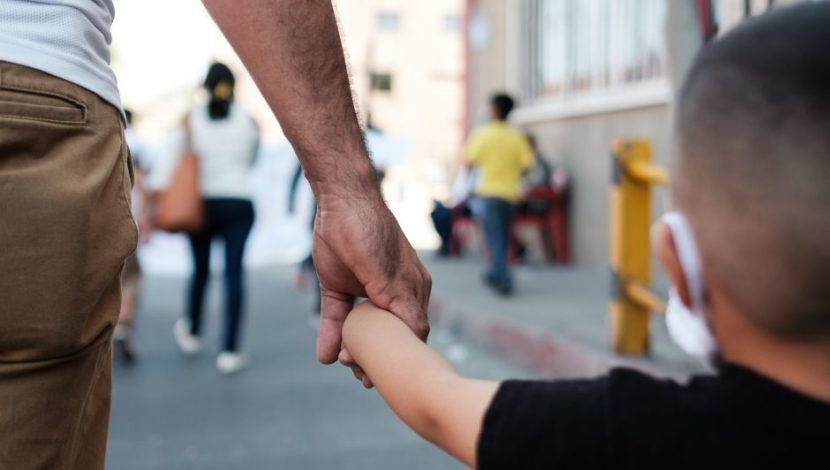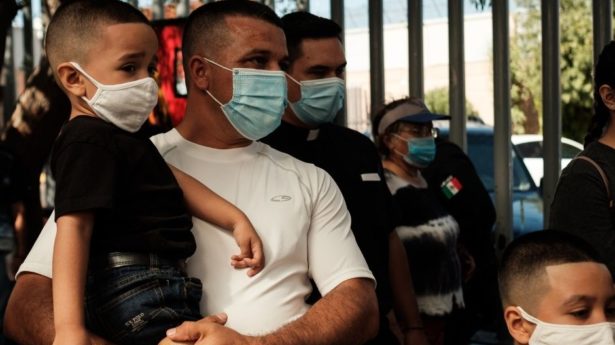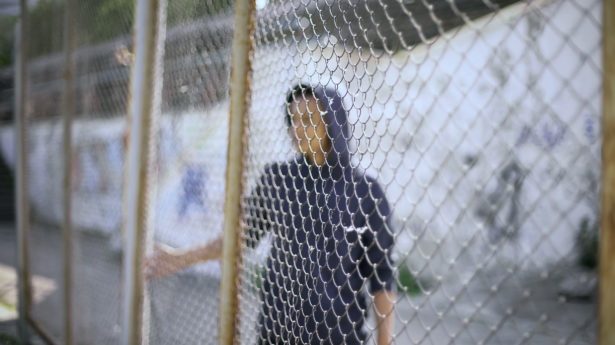The Unitarian Universalist Service Committee advances human rights through grassroots collaborations.
On This UN Day of Families, U.S. Must Do More to Respect Families’ Rights

By on May 14, 2021
On May 15, we mark the International Day of Families—an opportunity to call attention to issues affecting families worldwide and to honor the universal right to form and preserve a family of one’s choosing.
The Universal Declaration of Human Rights—a core source of inspiration for UUSC and other human rights groups—makes reference several times to families, in enumerating the rights that all people should enjoy by virtue of their humanity. The document speaks of the human right to “found a family”; to earn a living wage and secure adequate shelter and support for one’s family; and to enjoy one’s family life free of “arbitrary interference” by the state.
While U.S. authorities voted to endorse these principles in 1948, and politicians regularly pay lip service to the family as an ideal, our government often fails to respect these rights in practice and to honor the diverse forms that families take; in many cases, for instance, it has not moved beyond heteronormative and patriarchal assumptions about what constitutes prototypical family life. These failures are especially glaring when it comes to U.S. refugee and immigration policies. The following are some of the ways in which policy must change in order to live up to international standards of how families ought to be treated.
U.S. must provide permanent relief to families impacted by Trump’s “zero tolerance” family separations.
The Trump administration’s heinous “zero tolerance” policy separated thousands of parents from their children in U.S. custody—a practice that amounts to psychological torture. Today, years later, many parents affected by this policy remain separated from their children after being deported from the United States. Many of their children have thus spent key formative years deprived of the care of their parents. Reportedly, some have even lost the ability to communicate with their parents in their native Indigenous dialects.
The Biden administration has begun to reunite some of these families, but many more are waiting and have not yet received permission to enter the United States. Moreover, none of the parents affected by this policy has been granted a pathway to a green card, which would allow them to reunite on a permanent basis with their children. President Biden must expedite the reunification of the numerous families whom advocates and non-governmental organizations have already brought to his attention, and who are ready and willing to join their children in the United States. The U.S. Congress must also ensure a path to citizenship for impacted families by passing the Families Belong Together Act.
U.S. must stop causing de facto family separations through unjust border policies.
While the Biden administration has in many cases moved too slowly to address the family separations caused by their predecessor, they are also causing new separations to occur through their own unjust and ill-conceived border policies.
Since taking office, Biden has continued to enforce a Trump administration order known as Title 42—a policy that effectively closed the border to asylum-seekers and allows for the summary expulsion without due process of any person who enters U.S. territory fleeing danger. Though this policy was initially imposed under pretext of responding to the pandemic, reporting has shown that public health experts inside the Trump administration actually opposed it, when it was being considered. In reality, therefore, it was little more than a smokescreen to implement Trump’s long-standing anti-asylum agenda.
While Biden’s team has chosen not to use this policy against unaccompanied children, it continues to expel many families with children—including thousands of Haitian families fleeing a violent political crisis in their home country. This practice violates international refugee law and risks returning persecuted people to the very conditions they fled. It also forces de facto family separations, as some families stranded by Title 42 have no choice but to send their children alone across the border as the only way to reach safety and receive the asylum hearing to which they are entitled.
U.S. must stop separating families and denying families relief under the arbitrary and ad hoc policy of “humanitarian exceptions”—which are not an adequate substitute for the full due process protections asylum-seekers deserve.
In recent weeks, the Biden team has begun to admit a subset of families and individuals through ports of entry whom it deems to be particularly vulnerable, under what it calls “humanitarian exceptions” to the Title 42 policy. These determinations, however, are made with none of the legal safeguards and due process protections of the asylum system that Title 42 put on hold. As a result, the decision-making behind who gets an exception and who does not is shadowy and inconsistent.
In one emblematic case, a father and his 9-year-old daughter with special medical needs were inexplicably denied entry twice at U.S. ports of entry. Subsequently, they were expelled from the country under Title 42, despite the administration’s pledge to make “humanitarian exceptions” available under some circumstances.
These opaque and seemingly-random decisions have also caused still further family separations. In the case of at least one LGBTQ couple, one of the pair was reportedly granted entry under the “humanitarian exceptions” program, but the other was unaccountably denied, despite facing the same persecution risk. As a result, the latter was forced to pay a smuggling fee to make a dangerous journey outside official ports of entry.
U.S. authorities must reverse course on these policies in full, ensuring that all people who express fear for their safety have access to an asylum screening, as U.S. and international law require.
The Universal Declaration of Human Rights defines the family as the “natural and fundamental group unit of society” and therefore notes it is “entitled to protection by society and the State.”
Does the U.S. government still believe in these words, which it signed its name to more than 70 years ago? If so, then it must stop interfering with people’s right to form and preserve the integrity of the families they choose. Immigrants, refugees, people with disabilities, Indigenous people, Black people, LGBTQ people, women, and people with intersecting identities across these groups have all faced arbitrary interference with their rights to a family life from the policies described above. The U.S. government must recognize that families come in a multitude of forms, all of which are entitled to protection and respect.
***
About UUSC: Guided by the belief that all people have inherent worth and dignity, UUSC advances human rights globally by partnering with affected communities who are confronting injustice, mobilizing to challenge oppressive systems, and inspiring and sustaining spiritually grounded activism for justice. We invite you to join us in this journey toward realizing a better future!
Image Credit: Kino Border Initiative

